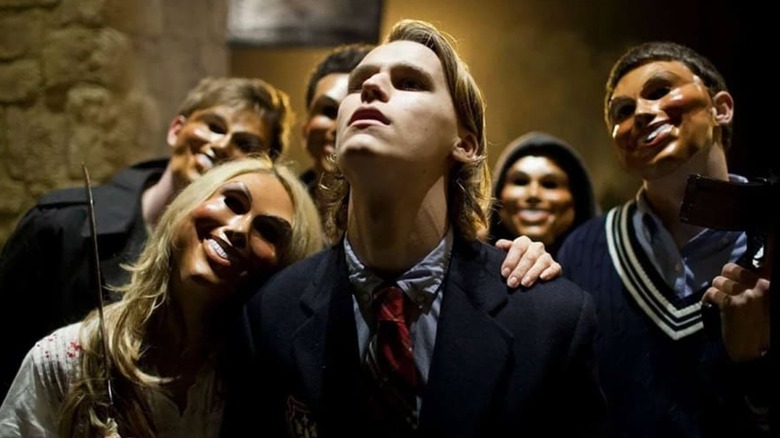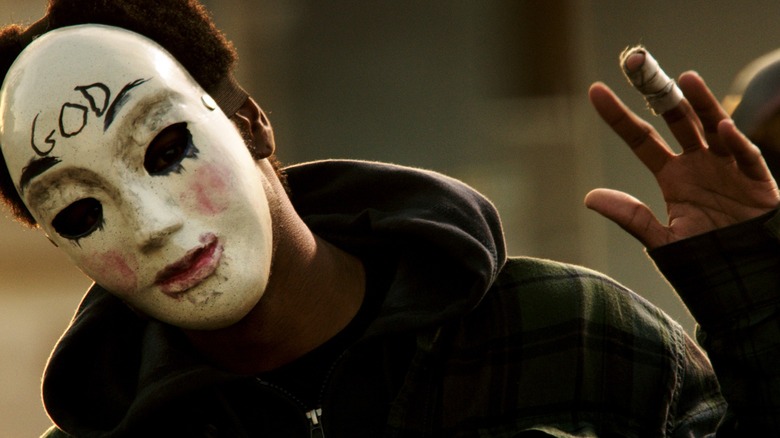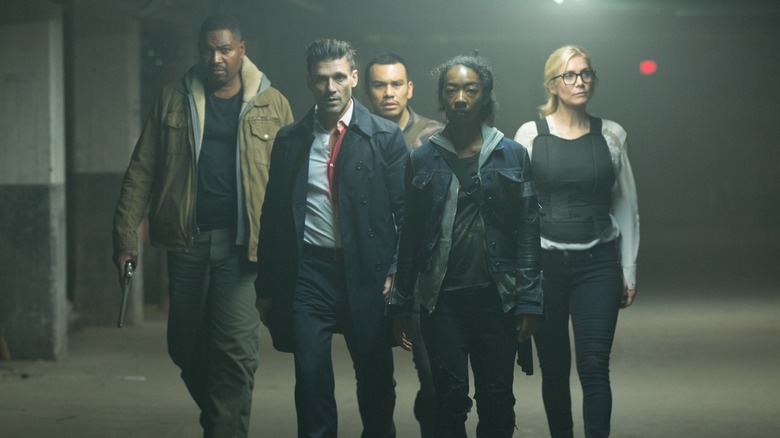The Correct Order To Watch The Purge Movies
This post contains spoilers for "The Purge" franchise.
2013's "The Purge" introduced an intriguing premise: in a near-future dystopia, all crime is legal for 12 hours once a year, allowing people to indulge in their most violent instincts. Written and directed by James DeMonaco, "The Purge" takes the home-invasion route, where a wealthy family unit finds themselves cornered by a bloodthirsty group of murderers itching to commit crimes without any consequences. The overwhelming success enjoyed by the film contributed to the making of an expanding franchise, with later entries retaining this core concept while introducing new socio-political facets to enliven their narratives.
While it is perfectly acceptable to watch the "Purge" franchise by the order of release date, following this format introduces some chronological issues, as later entries serve as prequels or expand the universe with some ties to the film franchise. Although we will be focusing exclusively on the movies, there is good reason to also look into the TV series anthology of the same name, to figure out where it might fit best into the timeline. However, it is also important to note that while the franchise entries feature significant connections to one another, the individual stories are primarily meant to explore the annual event of lawlessness through the lens of several protagonists and evolving cultural contexts.
Given how overwhelmingly disorienting the franchise timeline can be, here is the correct order to experience the nihilistic anarchy that defines every entry in this crime-riddled universe.
The only correct order to watch The Purge movies
First, here's the official release order of the films:
- "The Purge" (2013)
- "The Purge: Anarchy" (2014)
- "The Purge: Election Year" (2016)
- "The First Purge" (2018)
- "The Forever Purge" (2021)
But it is ideal to start with 2017's "The First Purge," which examines the very first time that this bizarre annual ritual takes place. On closer inspection, the tradition isn't bizarre at all, as it is triggered due to the wide, unbreachable gap between various social strata and economic classes, where the impoverished target the elite for a limited time in an attempt to level the playing field. In this film, a leading political party holds a test trial of The Purge on Staten Island, with the promise of a hefty sum to anyone who survives.
The next in the chronology is "The Purge" TV series, which provides an in-depth, grander context for this universe. If you wish to reserve the series for a watch later on, that is okay as well — the series focuses on the Purge of 2027, with several characters being forced to endure through the night. The show's second and final season examines the aftermath of the Purge of 2036, where interconnected anthology stories shed light on different kinds of situations. Interestingly, James Sandin (Ethan Hawke) makes an appearance, which sets the stage for this character's presence in the next film to watch, "The Purge."
After "The Purge," the rest of the entries are pretty straightforward, as they follow linear chronology and adhere to the release date order. First is 2014's "The Purge: Anarchy," which takes place a year after the events of the 2013 film, and hones in on LAPD security chief Leo Barnes (Frank Grillo), who uses this tradition as a cover to enact vengeance on the people who murdered his son. Several characters fight for survival, with the ever-growing presence of an Anti-Purge resistance group influencing the grisly events of the film.
The escalating anarchy of The Purge
2016's "The Purge: Election Year" brings back Grillo's Barnes while following an idealistic politician who wishes to put an end to this tradition, as she was forced to watch as her parents were killed on one such night 18 years ago. Although the franchise has always dabbled in political themes and the close relationship between the personal and the political, this particular entry leans heavily into the socio-political sphere while featuring dynamic action sequences to heighten the stakes. There's little to no subtlety here, but the film does a decent job of grounding the franchise's themes in ways that feel terrifying and relevant.
The final film to check out in the franchise (so far) is 2021's "The Forever Purge," which lacks the tact of the previous entries while proceeding to indulge in a brand of violence that feels exploitative. There is an attempt to grapple with sensitive racial themes and highlight tense contemporary issues, but the intent feels devoid of sincerity, which translates into a half-baked idea of a film that carries the franchise legacy on a superficial level. For some reason, this entry abandons the central idea of Purge Night, which defeats the purpose of examining a context-specific event that feeds into the wider socio-political arena and vice versa.
In essence, "The Purge" films are interesting explorations of poignant societal themes, together forming a bleak, dystopian world that often eerily mirrors our own. With the gestating yet-to-be-titled "Purge" film veering towards a fresh, sci-fi direction, there are plenty of complex, intriguing stories about humanity waiting to be told.


